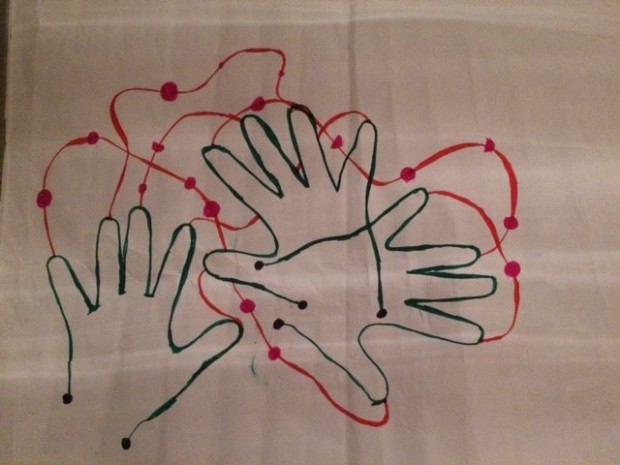Blog by Bella Wheeler
On 16th November 2016, I attended a workshop organised by the University of East London Centre for Narrative Research at the Thomas Coram Research Unit, UCL Institute of Education in London. The workshop was hosted by Professor Michelle Fine, from City University of New York (see www.publicscienceproject.org) and Professor Jill Bradbury, from the University of the Witwatersrand in Johannesburg, South Africa. Both Michelle and Jill carry out research with young people and adults, often living with challenging circumstances.
The day began with the question of how we make sense of our lives. What was the journey we had taken to where we were now? Who and what had helped us and who and what had hindered? What barriers and obstacles had we experienced and how might the combination of these have affected our ‘radical subjectivity’? Using visual methods, a group of approximately twenty of us attempted to answer this question through the drawing of maps, pictures, metaphorical abstractions and colour coded diagrams accompanied with various pieces of text. We explored that as humans we attempt to understand and acknowledge the contexts and histories that have shaped our lives, yet we are also aware of a sense of not wanting to be overly determined by them; we need and want to feel agentic.
Professors Bradbury and Fine continued to explore these questions through the notion of the relationships between the macro and micro, agreeing that history provides us with vital and often familiar narratives – stories of conflict and oppression or triumph in adversity and justice in the face of inequality. Yet we also discussed that perhaps now more than ever we need to find ways of resisting potentially reductive and over simplistic narrative tropes. Jill Bradbury suggested that we do not rush, for example, to ‘make sense of’ the recent election of Donald Trump, but instead stay with the shock of it, resist the urge for narrative closure and a perhaps too easy recourse to what may be familiar.
Perhaps this is the challenge of living in a complex modernity; how to manage ambiguity, ‘not knowing’ and a suspension of narrative certainty, the journey is not clear. Michelle Fine referred to identities in this multifaceted modernity as ‘hyphenated’, ‘borderland’ and ‘multiply committed’. As social scientists, academics and researchers we talked about the need to be attendant to narratives and listen without prejudice to things we might not want to hear. This raised the question of the lines between our ethical commitment to representing accurately and fairly the stories of our participants, and our task as academics ‘doing interpretative work’. Is all interpretation a form of theatre, as Professor Fine suggested? Do we have artistic licence? There were other questions related to relationships between the micro, particular, embodied and local and the macro and universalising. How might experiences of the everyday intersect with the macro and universal? How do people and communities develop and weave identities from these? What do they accept and what do they reject? Professor Fine described her use of Participatory Action Research with community groups and organisations and how through accessing information that they felt was relevant to them – police statistics on local arrests, school attendance or the use of green spaces – communities were able to develop and tell their own stories about themselves. In many cases, this was a radical act refusing the imposition of narratives from elsewhere. The question of ‘whether critical research can provoke a critique of structural violence and a re-imagination of radical possibilities’ perhaps remained unanswered, but a space for critical reflexivity is surely a vital place to start.

The Journey by Bella Wheeler

